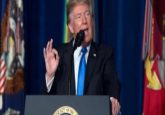NIH falls into the crosshairs of governmental funding cuts

As the disturbing trend for conservative governments withdrawing support for world-renowned national institutions rises, the USA’s NIH is targeted by President Trump’s 2021 budget plan.
There is a concerning trend arising in national politics that represents a great shift in political behavior. Conservative governments, nominally defined by their preservation and promotion of well-established national institutions that garner international attention and foster national pride, are beginning to withdraw support, and even target these very institutions.
NIH budget cuts
In the latest 2021 budget request sent from President Trump to Congress on the 10th of February, the NIH (MD, USA) is scheduled to suffer a budget cut of 7%, equating to a figure of over $2 billion. In addition, the National Science Foundations’ budget is due to be cut by 6% to just over $6 billion Dollars.
The implications of this funding cut are gargantuan. In 2020 the NIH plans to support 11,379 new and competing research grants. The new budget would hamstring this total and allow the NIH to provide grants and support for fewer than 10,000 projects.
For a country in which past Presidents, both from the conservative right and liberal left, have placed great stock in the NIH and used the institution as a way to promote themselves as a forward-focused, informed President, concerned with the health of their nation, perhaps epitomized by Richard Nixon’s’ ‘War on Cancer’, this signifies a dramatic change in approach towards the institute.
Reflections across the pond
This move is mirrored in the UK with the current plans of the Conservative government for the BBC (London, UK). This behemoth of media and one of the UK’s most treasured and respected exports conducts a vast array of services in the UK and throughout the world, from the creation and curation of television programs to running a multitude of national and international radio stations while providing comprehensive, neutral news coverage in the UK and the world through the BBC World Service.
Much maligned of late for supposed BBC political bias – an accusation that is leveled with equal volume and ferocity from both the left and right of British society – the incumbent Conservative party is considering decriminalizing the refusal to pay the license fee that supports the BBC with £3.83 billion, over 75%, of the institutes funding.
 Science under a Trump presidency
Science under a Trump presidency
How will science in the United States fare in the changing political climate, and how can scientists influence the outcome?
Why the change?
How has this change in attitudes to such titans of national pride – usually a cornerstone of conservative political rhetoric – come to pass? In an era when factual information and the opinions and warnings of experts are increasingly derided, both of these institutions stand as bastions of clear communication and the provision of fact-based information.
The NIH stands in direct opposition of some of Trump’s previously expressed opinions on climate change, both disputing that it is occurring and refuting human influence on the phenomenon, with their Institute of Environmental Health Science website stating that “steps can be taken to lessen climate change (‘mitigation’) and reduce its impacts on our health and the health of future generations (‘adaptation’).”
Meanwhile, in the UK’s previous election, the BBC conducted interviews with all of the competing parties’ Prime Ministerial candidates. All, that is, bar the Conservative party’s Boris Johnson (now Prime Minister) who refused to take part in an interview. Pursuing their obligation to fairly represent each party, the BBC pursued the interview, culminating in a direct calling out of Johnson by the famously obdurate political interviewer Andrew Neil. The BBC also reported on the fact that 88% of the party’s most promoted adverts featured claims that were not correct, or were not entirely correct. Similar deception was found amongst other party campaigns, but none to the same extent as the conservative party.
To directly claim that these actions of budget cuts and law changes are a definitive response to these actions may reach too far in connecting the dots, but when dramatic changes in attitudes and approach such as this occur, the motives must be probed and the question asked: why would a conservative government weaken an established institution?





